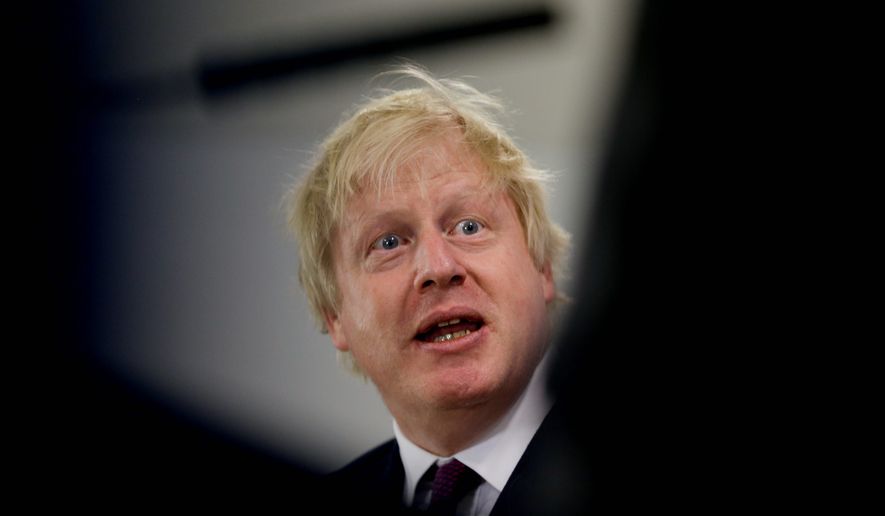OPINION:
The good ol’ boys, if there were any in Old Blighty, could tell Theresa May how and why she finds herself in such a mess in London, with a Brexit disaster only inches away: “You always go home with the one who brung you to the dance.” This is folk wisdom every conscientious mother should impart to her daughter, early and often.
Maybe it’s not quite fair to accuse Mrs. May of trying to go home with somebody she didn’t come to the dance with. She didn’t want to be at the dance in the first place. She dropped in only after the music started. She had nothing to do with choosing the ballroom, the band, the date or even the ribbons and bunting, and in fact wanted to be somewhere else, nibbling on Belgian chocolates. There weren’t any names on the dance card, anyway.
Leaving the European Union, and the litter of terminally officious bureaucrats determined to tell everybody how many times they could visit the loo, and when, was never the escape from Europe plotted to Mrs. May’s delicate taste. She likes the nanny state, and aspired only to be a deputy nanny. A lot of Britons like the comfort of a nanny government to look after them. Many Americans, particularly those who remember or who were weaned on tales of British resolve in an earlier time — “never have so many owed so much to so few” — sometimes don’t understand that “the few” have gone to Valhalla, and most of “the many” to the graveyard. Theresa May’s Britain wants no truck with the Britain of Churchill or Maggie Thatcher.
One British commentator argues that Mrs. May has had a rough day but “like a World War I general, she plods on amid the carnage convinced that her plan, a dog’s dinner of a Brexit if ever there was one, will be vindicated in the end.” And even if it isn’t, the bureaucrats in Brussels will shred it, to teach Britain and any others tempted to follow (Sweden, Denmark, France, Italy) a lesson they won’t forget.
Theresa May is widely regarded as a prime minister of what one domestic critic describes as “staggering ineptitude;” she made that “dog’s breakfast” of Brexit to a recipe that she could have avoided.
She could have led Britain to follow Norway with an off-the-shelf variant of Brexit that would have enabled Britain to write immigration rules of its own, enjoy freedom to cut its own trade deals with nations outside the EU, and govern with a seat of its own in world trade councils instead of sharing 1/27th of an EU seat with such mighty economic superpowers as Croatia, Malta and Slovenia. Timidity dispenses few rewards.
Mrs. May thought she had weathered a storm at the beginning of the week end when she announced that her cabinet had approved a “synthetic exit” from the EU, leaving Britain at the mercy of the bureaucracy in Brussels, leaving the kingdom (“the race of kings”) tethered to the Europeans like “a vassal state, a rule taker, not a rule maker.”
But then David Davis, her chief Brexit negotiator with the EU, resigned unexpectedly, saying he would not participate in a betrayal of his country. “I’m worried that what the European Union will do is simply take what we’ve offered and ask for more, or wait for more.”
He was followed Monday by Boris Johnson, the foreign secretary who from the beginning had supported leaving the EU in the national referendum two years ago. He describes Mrs. May of “lacking guts” and even compared her negotiating style as trying to “polish [excrement].”
There was much speculation Monday night in London that Mrs. May’s government was “damaged” and some voices writing it off as “doomed.” She vows to fight to save her government, which in a parliamentary democracy cannot survive a loss of the confidence of the parliament. A government on the run, as Mrs. May’s government is on the run, rarely survives. She received Boris Johnson’s resignation with all possible coldness, saying only that “the prime minister thanks Boris for his work.” Take that, Boris.
The prime minister pushes the argument that a clean break with the Europeans will bring down harm, confusion, ruin, disaster and national heartbreak. Big business, which always makes arrangements with bureaucracies and once in place wants them left undisturbed. Airbus and BMW warn they might not keep factories in Britain; Land Rover threatens, more or less, to suspend $100 billion in planned investments. But this is much like the mayor who threatens to close the orphanage if the City Council cuts anything out of his budget. Old Blighty will survive European threats and mischief. It always has.
• Wesley Pruden is editor in chief emeritus of The Times.




Please read our comment policy before commenting.